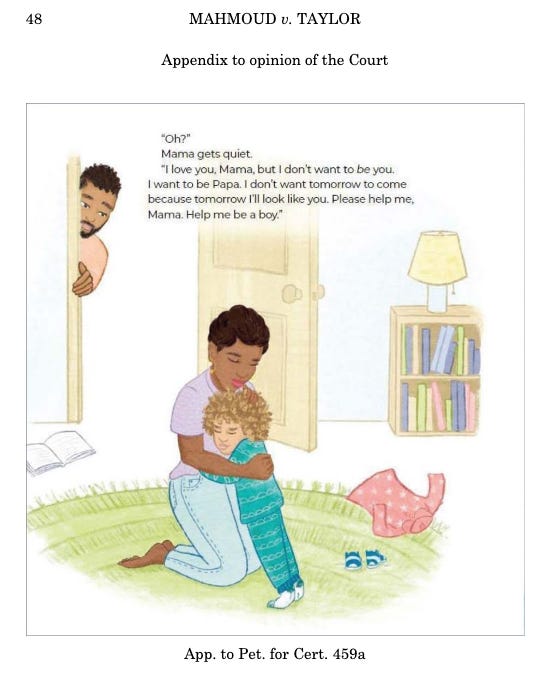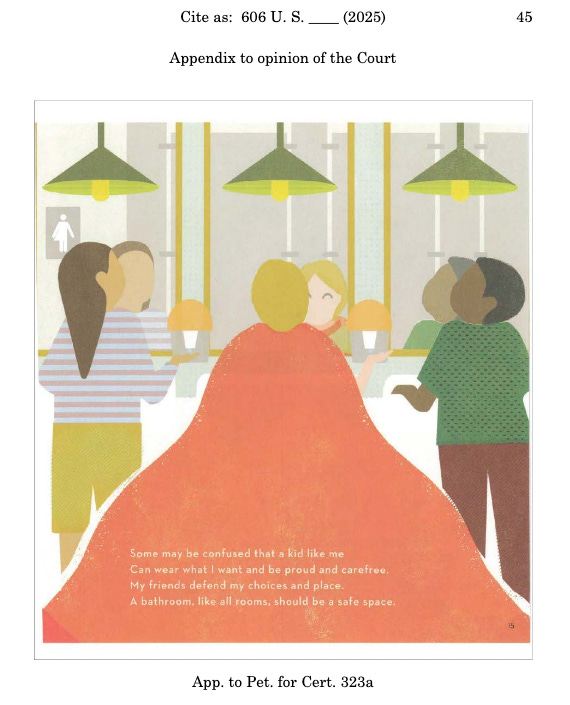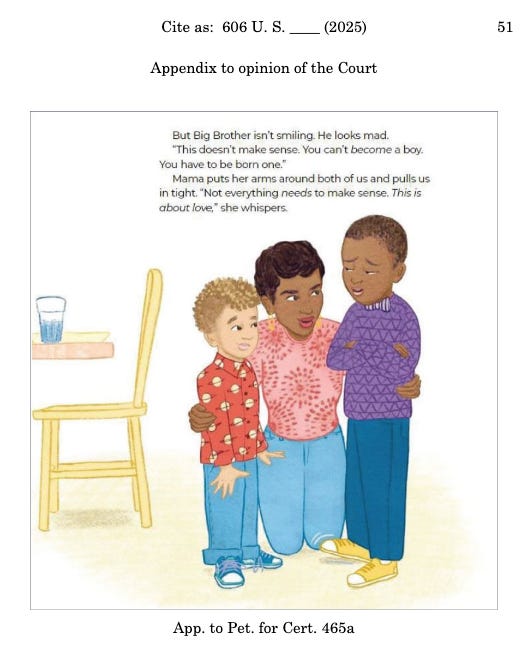U.S. Supreme Court Gives Parents Key Win in Mahmoud v. Taylor
Held: Maryland school board's introduction of "LGTBQ+-inclusive" storybooks for K-5th grades, along with decision to prohibit opt outs, was unconstitutional.

Last week, the United States Supreme Court delivered a major win for parent empowerment in Mahmoud v. Taylor (June 27, 2025, No. 24-297) 606 U.S. __ (citations will be slip opinion pagination). In this case, the Court held that a Maryland school board’s decision to impose “LGTBQ+-inclusive” storybooks and educational instructions on 5-11 year olds without providing parents an opportunity to opt-out placed “an unconstitutional burden on the parents’ rights to free exercise of their religion.” (Id., at pp. 40-41.) Although this decision concerned LGTBQ+ books and instructional materials, this holding may have ramifications extending beyond curriculum.
In this newsletter, we will provide you the key facts, takeaways, and implications. School boards will need to update their policies. Further, this decision supports dismantling school board policies that permit schools to socially transition a child’s sex without parental knowledge or consent. This decision will have far reaching ramifications.
Key Facts

The facts of this case drove the court’s decision. From the record, it was clear to the court that curriculum went beyond mere exposure to LGTBQ+ ideas to mandatory viewpoint indoctrination. The Court summarized the facts as follows:
The Board of Education of Montgomery County, Maryland (Board), has introduced a variety of “LGBTQ+-inclusive” storybooks into the elementary school curriculum. These books—and associated educational instructions provided to teachers—are designed to “disrupt” children’s thinking about sexuality and gender. The Board has told parents that it will not give them notice when the books are going to be used and that their children’s attendance during those periods is mandatory. A group of parents from diverse religious backgrounds sued to enjoin those policies. They assert that the new curriculum, combined with the Board’s decision to deny opt outs, impermissibly burdens their religious exercise.
(Id., at p. 1.) The opinion includes a lengthy factual recital, with these key facts:
Montgomery County is a populous, religiously and culturally diverse county, and the Board makes reasonable accommodations for religious beliefs and practices—except allowing opt-outs of the LGTBQ+-inclusive curriculum. (Id, at pp. 2-3.)
The Board chose the storybooks for K-5th grades based on the following criteria: “Is heteronormativity reinforced or disrupted?”; “Is cisnormativity reinforced or disrupted?”; and “Are power hierarchies that uphold the dominant culture reinforced or disrupted?” (Id., at p. 4.)
The five books at issue, Intersection Allies, Prince & Knight, Love Violet, Born Ready: the True Story of a Boy Named Penelope, and Uncle Bobby’s Wedding, promote same-sex marriage and the concept that gender is distinct from biological sex. (Id., at pp. 4-6.) For example, a discussion in Intersection Allies asserts: “‘When we are born, our gender is decided for us based on our sex . . . . But at any point in our lives, we can choose to identify with one gender, multiple genders, or neither gender.’” (Id., at p. 5.)
Teachers were instructed to foster discussion supporting the themes in the books and tell students it is “hurtful” to question whether a girl could become a boy. (Id., at p. 6.)
Initially, the Board provided parents notice and an opportunity to opt-out of the new curriculum. Less than one year later, the Board revoked the opt-out policy because they could not accommodate all the opt-out requests! (Id. at pp. 8-11.)
At a Board meeting, a Board member compared parents seeking opt-outs to “white supremacists” or “xenophobes.” She suggested such parents send their kids to private school. (Id., at pp. 10-11.)
The “LGTBQ+-inclusive” curriculum conflicted with the sincerely held religious beliefs of the parents. (Id., at pp. 11-14.)
Takeaways
The mandatory “LGTBQ+-inclusive” curriculum substantially interfered with the religious development of the children and unconstitutionally burdened religious exercise. The books are “clearly designed to present certain values and beliefs as things to be celebrated and certain contrary values and beliefs as things to be rejected.” (Id., at pp. 21-22.)
“Many Americans ‘advocate with utmost, sincere conviction that, by divine precepts, same-sex marriage should not be condoned.’” [citing Obergefell v.
Hodges (2015) 576 U. S. 644, 679]. And “Many Americans, like the parents in this case, believe that biological sex reflects divine creation, that sex and gender are inseparable, and that children should be encouraged to accept their sex and to live accordingly.” (Id. at pp. 22 & 24.)
The storybooks and accompanying classroom instruction are highly coercive for young children. (Id. at pp. 26-27.) Choice of curriculum implicates “direct, coercive interactions between the State and its young residents.” (Id. at p. 29.)
To the ACLU’s suggestion that objecting parents send their kids to private school or home school: “It is both insulting and legally unsound to tell parents that they must abstain from public education in order to raise their children in their religious faiths, when alternatives can be prohibitively expensive and they already contribute to financing the public schools.” (Id. at p. 34.)
The Board’s concern of an “unsustainably high” number of opt outs is “self-inflicted.” The Board “cannot escape its obligations under the Free Exercise
Clause by crafting a curriculum that is so burdensome that a substantial number of parents elect to opt out.” (Id. at p. 39.)
Finally, the Court recognized that schools cannot stigmatize and isolate one group of students in the name of inclusiveness. (Id. at pp. 39-40.) A welcoming, inclusive classroom environment cannot be achieved through hostility toward the religious beliefs of students and their parents.
Implications
This case was a strong rebuke of school board policies that trampled over parents’ legitimate concerns over a curriculum that not only advocated a viewpoint contrary to theirs but also called their sincere concerns “hurtful.” The court recognized the untenable irony of a policy enacted in the name of inclusiveness that stigmatized and isolated those who disagreed with it. A far reaching decision such as this will have far reaching implications. Here’s what I am thinking about:
School boards will be required to provide notice opt-outs for similar “LGTBQ+-inclusive” curriculum nationwide. Policies and state law will no doubt need to be updated. Check out Jon Fleischman’s article on this for a sample opt-out letter!
How will this decision impact the related issue of California school board policies permitting schools to socially transition students to the opposite sex without parental knowledge or consent? If mere curriculum is a burden to the free exercise of religion, certainly this would be as well! This decision puts policies like Newport-Mesa’s AR 5145.3 in the crosshairs.
Based on the reasoning in this decision, would courts entertain a free exercise-based challenge to other social/political indoctrination curriculum?
What do you think? How will this decision impact your school and community? Leave a comment!




